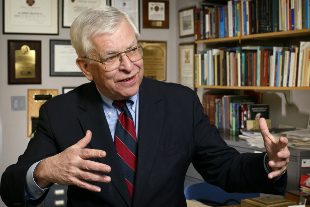 JOHNS HOPKINS MEDICINEThe researcher credited with inventing neurovirology, Richard Johnson, died of pneumonia last month (November 22) at Johns Hopkins Hospital in Maryland. He was 84.
JOHNS HOPKINS MEDICINEThe researcher credited with inventing neurovirology, Richard Johnson, died of pneumonia last month (November 22) at Johns Hopkins Hospital in Maryland. He was 84.
At the time of his passing, Johnson was a professor of neurology and neuroscience at the Johns Hopkins University School of Medicine. He arrived at Hopkins in 1969 and served as the hospital’s neurologist-in-chief until 1997. “He was an internationally renowned scientist who never showed off about it. He loved Hopkins and kept turning down high-status jobs elsewhere,” Paul McHugh, former Hopkins psychiatrist-in-chief, told The Baltimore Sun.
Johnson completed his undergraduate studies in 1953 and earned a medical degree in 1956, both through the University of Colorado. He studied at a number of hospitals including Stanford University Hospitals and Massachusetts General Hospital, and was a professor at Case Western Reserve University from 1964 until he joined the Hopkins faculty.
“He went on to invent the ...




















